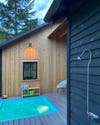If Your Home Search Has Stalled Because There’s No Pool, Consider This Petite Alternative
A real-estate agent offers sage advice on the topic.
Updated Mar 28, 2024 2:05 PM
We may earn revenue from the products available on this page and participate in affiliate programs.
Recently, Compass sales agent Cassidy Iwersen felt a shift in her conversations with home buyers: Most of her clients want—no, need—a house with a swimming pool, and they aren’t afraid to delay their hunt until they get one. “Once, it might have been a ‘nice to have’; now it’s becoming a ‘must have,’” says Iwersen. At least, it’s turned into a deal breaker for many living in the Dallas-Fort Worth area that she works in, but she suspects others who experienced record-breaking temperatures this year feel the same.
For the everyday homeowner, the draw of a pool is enjoyment: It’s an amenity a whole family can use. Some buyers with kids have admitted to Iwersen that having one even encourages their little ones to lessen their screen time. Adults feel the same way: “One of my clients with a high-powered job said, ‘There are only a few things that really help me decompress and where I feel really relaxed, and hanging out in the pool is one of them,’” she recalls.
What does all that zen time translate to in dollar signs? If you’re shopping for a home with a saltwater pool, you might expect to pay more for it and see more competition from other buyers, according to Zillow’s latest research, which suggests homes with saltwater pools sell for 1.5 percent more than comparable homes without one. Fortunately, most people don’t appear to care all that much about what the pool looks like but rather what shape it’s in. Older ones that require significant repairs can drag down the overall value of a property. “I always recommend getting a separate pool inspection,” says Iwersen.
And what if your budget doesn’t get you a place with a pool at all? Iwersen has witnessed many clients stall their searches as a result, but she is proposing an alternative solution: Commit to the house you love, and if it’s pool-less, build a 5-foot-deep plunge pool. While they aren’t necessarily that much cheaper to construct than your average inground pool (approximately $25,370), these tiny oases come with a ton of perks: You don’t have to have a huge yard to fit one (you can even put one on sloped terrain), it’s easier to maintain and clean, it requires fewer chemicals, and it won’t break the bank if you want to heat it in the cooler months.
This time last year, Karen Larson, cofounder of Soake Pools, saw record-breaking sales, 15 percent of which consisted of pools smaller than 7-by-13 feet. According to customer feedback, plunge pools fit well into the ever-popular outdoor living concept because they leave more room for other features such as firepits, lawn games, and alfresco kitchens. Read on for some more perks to paring back.
You Can Get One in a Matter of Months
Chapman Bullock, cofounder of Proper Plunge Pools, says half of its inquiries come from clients who want a pool within three months—a timeline that’s totally doable when the actual installation only takes a matter of days. “The traditional path is going to take [customers] 12 to 18 months,” he says. “People don’t want a construction site in their backyards for months at a time.”
You Can Order One on the Internet
Here’s a short list of a few designer-favorite sources for premade plunge pools:
You Can Now Turn the Temp Way Down
More of a cold plunge kind of person? Soake Pools recently announced the launch of its first plunge pool designed specifically for cold plunging. The basin is smaller, lighter, and more efficient than its counterparts. Measuring at just 4-by-4 feet, the compact unit is intended for sitting and comfortably fits one person to create a traditionally individual, energizing experience. In addition to selecting your choice of porcelain tile for the interior, there are three cover styles available: lockable wood roll, textured folding spa, or the power safety.
It Might Boost Your Value, But It’ll Definitely Perk Up a Listing
During the pandemic, it was clear buyers were willing to pay more for a home with a pool—specifically, $27,199 more on average. Generally, though, adding a pool of any kind solely to boost the resale value of your home is a gamble because you might not recover the total cost of putting one in. “I’m cautious to ever say that you can expect to get that back because there are so many other factors when pricing a home to sell, but I do feel that it does add value in most cases,” notes Iwersen. With that said: The appeal is real. “[Pools] used to be buried in the listing photos, and now I see them as the first one more and more!” she adds.
You Can Get Creative
The ultimate solution if you are on a tight budget and want a place to keep cool is to buy a stock tank and add a pump. The next best thing? An aboveground pool, which can range from $800 to $5,000. “I feel like people are getting creative with aboveground pools—connecting them to the house with a deck or building out a wood or tiled surround with steps so that they look more inviting,” shares Iwersen.
And don’t sleep on other water features either. When interior designer Kate Fudim bought her North Carolina home in 2021, there was a tiered fountain in the courtyard—she started requesting quotes from contractors to convert it into a pool ASAP. After a number of contractors quoted her up to $80,000 to do the job, she learned they could simply dig trenches around the lower pool and drill through the bottom of it to add inlets for filtered water and a light. They installed traditional pool equipment, filled it with salt water, and—voilà!—the whole job took three workers three weekends to complete for a grand total of $6,900. “The upper pool is fun because we use our pool floats and lounge around,” she says. “The bottom pool is deeper, though, and it’s in the shade, so I find it the most comfortable.”






